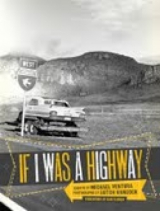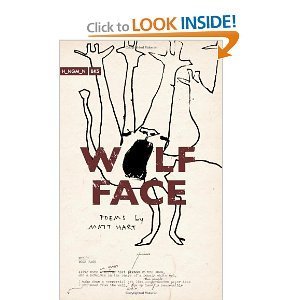Weston Cutter's Blog, page 31
April 19, 2011
Quick Elsewheres
[image error]For those of you remotely interested in reviews of the work done by one of the writers here, check out reviews of my (WCutter's) first book, You'd Be a Stranger, Too, at the following places:
@ the Collagist
@ the Rumpus
Book Notes @ Large Hearted Boy
An Excerpt @ the super cool Shelf Unbound








April 14, 2011
Reagan Duck Moonshining
Rawhide Down by Del Quentin Wilber
Chasing the White Dog by Max Watman

I was raised in a house in which my mom threatened my dad with divorce if he didn't vote for Mondale in '84 (we're Minnesotan–mom's reasoning was the guy had to win his own state). I also came of age during the governorship of Jesse Ventura, and I was, like lots of us, devastated by Wellstone's death in 2002. All of this is simply to say that, though I'm political, I'm from Minnesota, and I'm as liberal as they come, and I'm as frustrated as anybody by the almost comic adoration for Reagan that's become the norm in the last 10 or so years from both sides of the aisle.
However, my take on Reagan has been shifted by Del Quentin Wilber's fantastic Rawhide Down, the sort of historical book which a) all but demands to be read in one afternoon (both for how engaging it is and how compellingly Wilber writes) and b) will absolutely shock readers—the world 30 years ago is entirely different from the world we presently occupy, not least because of security measures taken for the sake of our presidents.
Like most folks, I read the first bits of Rawhide Down in Vanity Fair, and let me just say this: the book's a thousand times more interesting and engaging than the excerpt was, and the excerpt was phenomenal. I can't sing high enough praises for this book, honestly: regardless of where your politics lie, this is a book that'll knock you glad on your ass and leave you gasping—at how narrowly disaster was averted, at the to-the-bones decency of people you may've until now suspected to not have much decency, at what happened how 30 years ago in front of a hotel. You'll likely see this book everywhere: I'd encourage you to believe there's a good reason for that—you should read it and find out and agree.

Remember that Harper's article from like three years ago? About the big plastic deadzone in the Pacific, north of Hawaii, that Texas-size mass of debris? It wasn't just a regular article but one of those Harper's folio pieces? (coincidentally, that article was just referenced like today by n+1) This is the book that came from it.
Honestly: if you're not reading Hohn, you're an idiot. Hohn's who to read if you like Bryson, Wallace, McPhee, any of the great nonfiction folks. There's facts galore in this, and the facts themselves are great and fascinating, but far more compelling is how many of them Hohn gathers and stuffs into one place, and the effect such an infoload causes on the reader. Here's what I mean: the book's essentially about a shipping container of rubber ducks which went overboard in the Pacific—that's its starting point. Yet through that single object and event, Hohn travels the world, examines environmental effects, considers the facts of consumption and disposability, the lastingness of things, etc. It's a whallop of a book, over and over—best not to miss it.
 Max Watman's Chasing the White Dog seemed, to me, inauspicious for a bit: I was worried, after having read a few books recently which essentially tease the reader about focusing on a single object or pursuit when, in fact, the books are simply considerations-of-self on the part of the authors, that this'd be another book like those.
Max Watman's Chasing the White Dog seemed, to me, inauspicious for a bit: I was worried, after having read a few books recently which essentially tease the reader about focusing on a single object or pursuit when, in fact, the books are simply considerations-of-self on the part of the authors, that this'd be another book like those.
Oh my lord was I wrong. I mean it: I picked this book up with suspicion and caution, but I was so deep in so fast I didn't notice the pages going by. Is part of my enjoyment of the book a matter of me caring more about moonshine than about, say, a baseball team, or a store in NYC? Sure. But also, Watman emphatically cares, page after page, about his subject: moonshine, the culture (both real and created) which surroundings home distillery (the first 30 pages are fantastic just for the deflation they provide of the creaky old back-porch old-boy clubbiness one might [rightly] imagine is a central component of 'shining), what it means to try to make one's own liquor. It's just rivetingly great: please don't be the idiot I was. Please don't approach this book with anything but the most fervent excitement and gratitude.








April 10, 2011
Four Quicks
So Much Pretty by Cara Hoffman
The Gospel of Anarchy by Justin Taylor
There Is No Year by Blake Butler
Three Stages of Amazement by Carold Edgarian
(Note: You should really purchase and rapidly read all four books under consideration.)

Holy shit is this a beautiful book: this is what to read next if you finished the ravising Visit From the Goon Squad and felt that sick internal fall, the one you taste when you get through a work of glory and beauty and then go wait, what can I read next that'll come close? The one to read next: Egdarian's gorgeous, gorgeous book.
It is, very simply, the story of a marraige: Charlie Pepper and Lena Rusch are a San Francisco couple negotiation present life—and very present, I mean: real people are in here, real issues (Obama's election's mentioned, and, at a ritzy party, Al Gore's in attendance). Charlie's a doctor (ha ha ha, Dr. Pepper—it's the only cheap joke Edgarian tries in the book, and it's not even cheap, just cutesy; it works) who's trying to get funding for a robotic surgery process he's helmed with a colleague. Lena works part-time as a writer (I may not be 100% on that fact—she works for someone else, punching up scripts, maybe, or in some way connected to advertising—the fact that I can't remember shouldn't be a sign of my lack of concern but at the insignificance of Lena's work as a plot device). They've got a son, and they've got a daughter who was one of a pair of twins; the other twin died. I want to make it that stark and black + white because it's one of the things Edgarian does best in this book: the fact of Charlie and Lena's life together, as a family, are presented just as that. In a lesser writers' hands, the fact of a dead child would be the engine for the whole novel.
Not so here: the book is fundamentally about the process people go through to become themselves, even at middle age. The challenges and trials of youth—defining oneself through pursuits, allegiances to idealogies, etc.—continue, Edgarian shows, throughout: Lena's uncle, from whom she's estranged (rightfully), shows up to complicate things, as does an old beau of Lena's. These are, however, silly to write about like this: the book's glorious and moving and jaw-droppingly pretty: there are sentences in this book which should be taught to anyone trying to write. It's a shockingly good book. If you want a novel which'll have you caring and believing and breathing deep and hard because of what happens to the folks therein, you've now found what you've been looking for.

I don't want to say too much about Blake's There Is No Year—it's fantastic, better than any of us could've expected or hoped even having read Ever and Scorch Atlas. The book's a madhouse depthcharge, and Blake's got language in rivers in him that nobody, nobody, has got. If you claim to care about contemporary fiction and you're not reading Blake Butler, you're lying to yourself or dumb (see my interview with the guy here)
any of us could've expected or hoped even having read Ever and Scorch Atlas. The book's a madhouse depthcharge, and Blake's got language in rivers in him that nobody, nobody, has got. If you claim to care about contemporary fiction and you're not reading Blake Butler, you're lying to yourself or dumb (see my interview with the guy here)
And, because of the HTMLGiant connection, there's Justin Taylor's debut novel The Gospel of Anarchy. What could've been an easy, brief, disposable read—post-college or college-age kids hanging out, trying to find meaning, something to give a shit about and/or believe in—is, in Taylor's hands, a really, really good first novel. I don't mean to downplay that: the book's very good. Is it great? I'm not sure. It's a hell of a good read. It captures the desperate energy of a certain age better than many books. There's an oh-I-get-it aspect to the book, in a way: it's about young people who live in the same house and want some hook on which to hang their wanting beliefs. There's a trickster, there-and-gone figure, who blasts mightily in these young peoples' sky. I'm not saying this stuff's been written of well before, necessarily: I'm saying that if you've gone through yr late teens/early 20′s with a certain aspect of desire and hope and searching, you've felt what Taylor's written.
Is it a great book? It's a very, very good book. The praise is earned. Taylor's absolutely a writer to watch: dollars to donuts his next one, whatever it is, is a mind-blower of magnificent proportions.

The book's an attempt to make a high school shooting make ideological sense, and, to do so, Hoffman puts her cards hard down. I can't give too much away—the book is, fantastically, written with the plot unclear throughout—chapters swap voices, and the principle characters all get their chances, hinting about something that's happened on April 14th (two days away from what all VT students remember as being The Day). It's weird: the book's tremendous and great and a phenomenal read. It's also, I've got to point out, an attempt sensically sort out violence, which is fine, to a degree, but there's an aspect of So Much Pretty which feels contrived, which feels as if it takes too easy a view of causality. That's a bigger discussion than needs to be gotten into here: you should for sure buy/read So Much Pretty, but you should also let your own questions bubble to the surface as you read it. You should for sure wonder if the answers or assumptions provided mirror the world you know and live within. That said: Hoffman joins a stupidly small group—Bolano's in there—of folks who are boldly wrestling with real questions regarding violence and gender, and, for that alone, she deserves massive applause and support.








April 6, 2011
Michael Ventura, Same Genius as Ever
 Let me be 100% clear from the start: Michael Ventura is one of my all-time favorite authors, and he is, for my money, one of maybe ten truly indispensible American authors working at present. If you live in a good city, you may've been lucky enough at some point in the last two decades to, in your local arts weekly, find a column titled Letters at 3AM. I grew up in the twin cities, and the City Pages, when it was still magic and fantastic, ran Ventura's Letters columns at, for me, a real critical time—like '95-2002, I think, or roughly thereabouts (the column still runs, every two weeks, in the Austin Chronicle). What happens when you're 16 and you read a guy talking about love being the magic it is because it breaks us out of pattern and offers glimpses of potential and promise we hope to still possess, or a guy writing a list of what he believes are the Solutions to Everything (and, better, when the Solutions are bullshit free in ways most info doesn't for 16 year olds)—what happens when you're 16 and you see writing like this is you feel almost comically grateful, like you've found some unspoiled river that runs right through everything, even if it's not what everyone's paying attention to.
Let me be 100% clear from the start: Michael Ventura is one of my all-time favorite authors, and he is, for my money, one of maybe ten truly indispensible American authors working at present. If you live in a good city, you may've been lucky enough at some point in the last two decades to, in your local arts weekly, find a column titled Letters at 3AM. I grew up in the twin cities, and the City Pages, when it was still magic and fantastic, ran Ventura's Letters columns at, for me, a real critical time—like '95-2002, I think, or roughly thereabouts (the column still runs, every two weeks, in the Austin Chronicle). What happens when you're 16 and you read a guy talking about love being the magic it is because it breaks us out of pattern and offers glimpses of potential and promise we hope to still possess, or a guy writing a list of what he believes are the Solutions to Everything (and, better, when the Solutions are bullshit free in ways most info doesn't for 16 year olds)—what happens when you're 16 and you see writing like this is you feel almost comically grateful, like you've found some unspoiled river that runs right through everything, even if it's not what everyone's paying attention to.
But let's say you haven't spent time in a good city. Let's say you've just had access to books and bookstores. Fine: Ventura's the author of three novels, some poetry, and, with James Hillman, We've Had a Hundred Years of Psychotherapy – and the World's Getting Worse. He's written screenplays for movies. From the evidence gathered in his latest book, If I Was a Highway, you may've seen the man at some point, driving cross-country—he drives a '69 green Chevy Malibu, he wears glasses, he's often got a fedora on (the one time I've seen the man, I saw him decked in exactly these specifications). Regardless of whether you know Ventura or not, though, I'm here to tell you now, for real, you need to know him. For real. You need to have this voice among yr books. You need to have this traveled voice in your head, if only as counterpoint, the half-trickster-ish voice that marks the best in American wisdom.
And what a voice: If I Was a Highway is a gathering of Ventura's Letters at 3AM columns (if you're the collecting sort, purchase this book and find old copies of Shadow Dancing in the USA and Letters at 3AM: Reports on Endarkenment and you've got, poof, instantly, a good chunk of columns by one of the best American columnists going). The Letters columns are wild, wise, dusty columns about self and identity, about travel and searching (for The Moviegoer fans, consider Ventura a Texas-style cousin of Binx's [though Ventura's from Brooklyn and spent years in LA, he lives now in Lubbock, and whatever else Texas is, it seems to be his voice's best home]). These are columns about America, in all the big and small ways—the fattening of the place, the wild careeners who follow their own call and are redeemed by the search, the moneyed farce that is politics, all of it. They're about cars and rebels, about home and friends.
Of course, none of that abstract nonsense comes close to capturing what Ventura captures in his columns—and, unfortunately, snipping sentences to give a taste of the man's style doesn't remotely do him justice: "And let's remember that when the McDonald's opened, nobody put a gun to anybody's head to go there instead of to So-and-So's cafe. Choices were made, a way of life was betrayed, and nothing was ever the same." So much of the glory of Ventura's writing comes through in that passage—the bullshit-free glance that cuts through the day's stuffing to find the meat, the shameless honesty. But these words, when they all get gathered together, produce a whallop greater than you can imagine: reading Ventura's unvarnished honesty hits as it does because, after all, he's not hopeless, all's not lost. These are, yes, bleak times, and that bleakness is adequately reflected here. But there are other facets in the mirror, other things you probably haven't noticed which should give you pause, which should make you glad to be alive and aware. Ventura notices these things, writes them all down, says see, says there's more here than you've seen, than you think you know.
You'd best heed the man. Tune in to his radio. You'll be a better and changed person for it. And, for the record: this is the first book I've ever read from Texas Tech University Press, and it might be the best looking object I've seen in awhile, book or otherwise. I haven't even mentioned that, aside from the Ventura words, there are, throughout, photos from Butch Hancock, whose music is as worth your time as is this book featuring his photos. You're a fool to miss this.








April 2, 2011
Tis the Season and All
In the Time of Bobby Cox by Lang Whitaker
 I don't want to bore anyone too much with fandom regarding America's pasttime, but I'll just note that the Twins, yes, lost their first game of the season, but they happened to lose their openers in '09 and '10, and they clinched the AL Central division both years as well, and I'm not stupid enough to claim causality, but it's worth acknowledging that the sky falls slower than most of us believe (even if 12-3 is a brutally ugly score to have to stare at).
I don't want to bore anyone too much with fandom regarding America's pasttime, but I'll just note that the Twins, yes, lost their first game of the season, but they happened to lose their openers in '09 and '10, and they clinched the AL Central division both years as well, and I'm not stupid enough to claim causality, but it's worth acknowledging that the sky falls slower than most of us believe (even if 12-3 is a brutally ugly score to have to stare at).
Okay, enough Twins stuff: under consideration are two books, one of which is about the last team the Twins beat in the '91 Series: the Atlanta Braves. I neither love nor hate the braves, but Whitaker's book in fact doesn't require a certain fandom to enter—which, of course, makes it a sort of strange book. For those of us who read and loved Blythe's To Hate Like This is to Be Happy Forever, I'd guess it didn't much matter if we were UNC or Duke fans (full admission: I was exactly that pasty white sucker who loved Duke in the Leitner/Hill/Hurley years)—the book was a fuseblower because it was so engaged and -raged. Part of the fun of the thing was to feel someone's seething interest and care come alive on the page. It's the same all over: I'm required to hate the White Sox, but I'd love to read a good book written by someone who cares passionately about them (or of course there's Exley's Fan's Notes).
Which is why Whitaker's book is an okay but ultimately strange (and slightly unsatisfying) read: instead of using his love of the Braves (and his respect for their recently-retired manager Bobby Cox) to some larger purpose or end, Whitaker basically uses the Braves and Cox as a way to talk about himself—his adolescence, his friends, his work, his wife. Which isn't necessarily a problem, but—and I say this as someone who, like Whitaker, writes and cares about certain sports teams—Whitaker's made the off-putting assumption that simply because it is his life it'll be interesting for others. Memoirs written by dudes of (roughly) the same age and demographic need to bust ass to escape being yawn-inducing or inspiring the sense in the reader that s/he's already read something so similar already that the book's almost literally pointless. I'm not saying 25-40 yr old white dudes with college degrees and an interest in writing should never write memoirs—Nick Flynn's first one is great, as is Eggers, and John Jeremiah Sullivan's Blood Horses is so fucking good it'll leave you shaking [a note: he's got a book of essays coming this fall, and he just wrote a phenomenal review of Wallace's The Pale King, and if you've got a few spare hours you should read everything by Sullivan you can--dude's the current master, for my money].
So: the book's called In the Time of Bobby Cox, but the subtitle reads The Atlanta Braves, Their Manager, My Couch, Two Decades, and Me, and you should be appraised that what this book's really, truly about is the subtitle's last word: this is about Lang Whitaker. Does Lang Whitaker seem to respect and enjoy Cox? Absolutely. Is he a fan of the Braves? Sure. But he's also, throughout the book, so unclear about any end other than examining himself that it's hard to even know what to care about. Plus some aspects of the book simply beg questions and will, I'd guess, induce frustration: there is, for instance, a 30 page "intermission" in which the author ranks—subjectively, as he totally admits at the start—all the players who've played for the Braves since Whitaker started taking his fandom seriously. It's a disspiriting read: "168. Ryan Lanerhans—We share part of a name; I had to pull for him." Or: "139. Willie Harris—I like any baseball player with a gold tooth." What the book ends up feeling like, more than anything, is one that was written as a pitch (ha ha) about sports but which, who knows when in the process, became essentially a tool through which Whitaker could focus on himself (this is a whole tricky thing, and something that seems to happen relatively frequently—My Korean Deli by Ben Ryder Howe feels like a similar exercise). That's not a problem, necessarily, but it does narrow the prospective size of the audience which'll find much to love in this book.
The other baseball book here to be considered is Zack Hample's The Ball, which is, literally, a 300+ page shaggy book on not baseball, but on the baseball. Hample's a ballhawk—he's got the largest collection of snagged game balls in existence—and he's nothing if not as enthusiastic about gathering and presenting as many nuggets of info regarding balls as he is, apparently, about gathering the balls themselves. You're now free to wonder if a 300+ page book on the ball used in games is necessary. I'd argue no: though interesting in bits and fragments, those frags and bits are way too few and far between to merit having a whole book devoted to them.
A last note: I feel slightly bad negatively reviewing two books on my favorite sport right as the season starts. Let me just say there are plenty of great baseball books out there, and there are certainly more to come, probably soon. Given your options at the moment, with these two books, however, you're better off buying a pair of tickets to catch yr favorite team during its first home stand of the series.








March 21, 2011
Multiple Quick Ones + FREE
 Stealing the Mystic Lamb by Noah Charney
Stealing the Mystic Lamb by Noah Charney
Fantastically readable book about the most stolen piece of art in history—the altarpiece at Ghent. I don't know how much art knowledge or appreciation one needs to fully dig this book—I'm pretty fond of art, but not necessarily of this particular piece of art.
Still, you're missing something critical if Charney's stories don't suck you fully into this piece of art and the stories that surround it. Here's one: the painting features more than a dozen separate panels, and right this moment no one is 100% certain if one of the panels is "fake" or "real" or not (it's an incredibly cool story; you're better off buying the book and discovering the details instead of hearing it from me). Here's another: Hitler had an underground mine in which he stashed looted art, and that mine was hours from being detonated during WWII.
Charney's great book should, far as I can tell, offer something for any reader—fascinating background on art and art history, stories of duplicity and theft, religious details, etc. Get cracking.
If you know the name Kevin Mitnick (or read the journal 2600 [I'm looking at you, PW]), you should probably automatically just read this book (or, also, holy shit, if you know Kevin Poulsen's name and/or have read the book about his hacking exploits—I just now put it together that this is him). If you've ever purchased or seen tags-still-on-it stuff on ebay, you should read this book. If you're curious about what exactly theft looks like when it transpires online, you've got to read this book. The book's subtitle, How One Hacker Took Over the Billion-Dollar Cybercrime Underground, does a weird sort of justice to the actual story presented in the book. Yes: Max Vision took over the cybercrime underground, but there are plenty of other details that make this book and story eminently readable and worth the time.
Moonwalking with Einstein
by Joshua Foer

This thing's been written up already at plenty of other places, so I don't want to waste anyone's time, but I will just say it's a damn, damn, damn good book, and fun to read, and will leave the reader asking real serious, fundamental questions regarding memory and identity, to say nothing of leaving everyone, all of us, wondering how much we're capable of remembering. No comment on the fact that the Foer brothers are taking over publishing and precociousness, whether they're competing for coverage or most books at a certain age, whatever.
 My Korean Deli
by Ben Ryder Howe
My Korean Deli
by Ben Ryder Howe
This book's a hell of a lot of fun to get into, even if Howe—a former editor at the Paris Review (Plimpton dies late in this book—that's not to sound crass or cruel, but just to put things into context)—sometimes lets the book suffer a bit much from being so him. I don't know how to nicely articulate this complaint—it's the same (minor) beef I had with Sean Manning's The Things That Need Doing: it's a frustration with memoirs which are totally, impossibly dependent not just on the author's voice, but on the maneuvers of the author's voice. In other words, the thought/voice and how it doubles-back and wonders about itself actually functionally structures how things transpire on the page of the book. Which, of course, is how every book, memoir or not, works, to some degree, bt Howe seems a bit extra keenly aware of his own thoughts.
Which, actually, is a mostly minor thing, overall: it's, again, a hell of a lot of fun to get into. I got tired of the voice, but my distaste is as personal as the voice Howe uses. Read it; decide for yourself.
 Separate Beds
by Elizabeth Buchan
Separate Beds
by Elizabeth Buchan
I'll have a review shortly of Carold Edgarian's unstoppably gorgeous Three Stages of Amazement soon (have you read it? Hot damn hot damn), but I want to mention that other book because it, with Separate Beds, is part of of a 1-2 combo of books which I began thinking well, whatever, I'll read a few pages. Why? Because both books are about middle-aged couples, and are told from the female protagonist's pov. Do I only read stuff written for/about me? Course not, but, come on, middle-aged stuff?
Here's the dirty secret truth: hell yes, middle-aged stuff. I was 50 pages in before I'd even blinked. Is it shattering, life-changing fiction? No. But it's a story that satisfyingly passes the time. Also: I've got a copy of this to give away–send an email (wlcutter[at]hotmail) and it's yours.








March 19, 2011
Super Cool
There's a new thing, and it's called Toad, and it's here, and you should go check it out–poetry from Zapruder + Lasky, fiction from Beilin, Jack Ridl work. You're looking for more?
And if you're in the mood to see more elsewhere: here's the latest from the Ploughshares blog.
Okay, back to book reviews in a moment.








March 17, 2011
Quick Yesses Regarding Various Recent Poetries
 Poems by Elizabeth Bishop.
Poems by Elizabeth Bishop.
Is there already a Collected Poems of Bishop's? Sure there is. Is there also, even after that, a collection with pulls from her unpublished stuff? Indeed there's that, too. Meaning: why would anyone need to publish or buy more Bishop stuff? Answer: because Bishop's stuff is some of the best American poetry made in the last century (and this coming from someone who loathed the work, originally—hated the turgid pace, the seeming casualness), and because no matter when the last time you read "One Art" was, you need to read it again, and because you may, like me, not yet own a copy of "It is marvellous to wake up together…" which was originally included in Edgar Allen Poe…, but I hadn't seen it before now, and holy crap, that's what: holy, holy something or other, anyway.
The Captain Asks for a Show of Hands
by Nick Flynn

Sure, I'll admit it: I leaned back from The Ticking is the Bomb, because I have conflicting notions of memoirs, and I didn't want to read the dude's second memoir, but I'll 100% cop to loving Another Bullshit Night, and to being just crazy for the guy's poetry. And so when this came, I ate the thing breathless, more than glad. Flynn's essays of late haven't really done much for me, but somehow the poetry—which largely takes as subject the same stuff he's covering in nonfiction (torture, US policy, fear/terror, being responsible)—just sings, perfect-voiced.
 Wolf Face by Matt Hart.
Wolf Face by Matt Hart.
Speaking of perfect voices. Speaking of one of the first two books from H_NGM_N. Speaking of "This Amazing Confoundedness" and "And Then There's This" and "You Are Mist." Speaking of homophones. Speaking of a book which sneaks up weirdly: it's right there, Wolf Face, but doesn't feel predatory in the direct and snarling way. Speaking of indirect. Speaking of finding a place to fit yourself into comfortable for an hour or maybe two. Speaking of having a book worth finding such space and time for.
 Speech Acts and Panic by Laura McCullough
Speech Acts and Panic by Laura McCullough
Yes: she had two books come out simultaneously, and they came out in that order, and that's worth noting simply because Speech Acts fundamentally (and weirdly) ends up informing the reader not just about reading McCullough's work but about how to read her work, what it means, what it's up against, in her, and how things come through. I want to note that I almost didn't include anything about these two here, because they deserve way more space than this. Maybe the best I can say is this: Speech Acts is as interesting and saucy a field guide to the making not just of poetry but meaning (which drags of course also questions of intent and association, there's a good deep fall in store for the reader) as I've seen ever, and Panic is as clear and unsentimentalized an account of a bad event in a book of poetry I've read. McCullough deserves way more than this measly mention, but it's a start: reward her with your time and readerly energy.
World Tree by David Wojahn
READ IT READ IT READ IT. I had no idea. I'm ashamed and embarrassed that I haven't fallen hard already for Wojahn. Read it, if nothing else, because Wojahn's doing rhythmic structural stuff in his poetry that makes a whole mess of other poets look like they're not even trying to answer any questions about beat, pulse, the ticking that blips beneath us all. It's a hell of a book (even if the big, interesting, words + pic section at the book's heart is, actually, the least resonant).








March 13, 2011
March is National Story Month
Because it's a month in which a Jim Shepard collection's to be released, it's easy to assume that his You Think That's Bad will be the best collection of short stories released this month. Actually, that might be foolish: I don't want to posit any of this as something competitive. Here's what I mean: Jim Shepard's got a new book, and it's being released near the end of March (two days after an incredible person's birthday, one day before another incredible person's birthday), and for those of us who've been reading contemporary American fiction for the last decade plus, we know that a book by Shepard is one of the best gatherings of fiction there will be this year. A book by Shepard has, at this point, become akin to a book by Munro—both authors are almost mind-bogglingly consistent and their stories are, at very best, trap doors through which the reader gladly falls and, through falling, understands or realizes or sees the world anew. That sounds lofty, but it's true, as anyone who's read Munro or Shepard can easily back up (for the record: I interviewed the man when his last book hit).
Here's what else, though: if you enjoy short American fiction, you're in for a hell of a month. Because not only do you get Shepard's new one (which, yes, features his National Magazine Award winning "The Netherlands Lives with Water," and also "Boys Town," that recent devastator from the New Yorker), but you get Alan Heathcock's Volt, which has to be one of the best debut collections in the last five years. I mean this 100%: any reader with an ounce of sense would have to include Volt when talking about recent biggies (I don't want to be critical, but Wells Tower's Everything Ravaged, Everything Burned was, yes, a great book, but putting Volt next to it makes it seem thinner somehow, paler).
Here's how a genius book begins: "Dusk burned the ridgeline and dust churned from the tiller discs set a fog over the field. He blinked, could not stop blinking." Here's what I'd like to make abundantly clear regarding "The Staying Freight," Volt's opening story and my vote for the year's best (an excerpt of which is here): the story's title is a trick, or at least is engaged in multiple entendres, because you, as well as the story's characters, will be dealing with the freight of that single story for awhile. You will. On finishing it I tried to remember the last story that stuck—clung, really—so fast and hard inside my head. It's hard to think of many this good.
What's so great about Volt, anyway? Surely it's not enough to just quote to sentences and shuffle off, meaning hopefully transmitted. Here's what's astonishing:
 : The faux-McCarthy voice—flattened, relatively comma-free, thick with casual ferocity—is one of the easiest-going masks fiction writers can pull. Good, hard readers and writers can discover for themselves, quickly, the limits of taking that model of voice out without knowing exactly how to execute it perfectly. Heathcock's voice certainly has elements of that bristling, sedimentary tenor (opening at random: "Tonight her hands shook as she laced her boots, lots in the throes of a more desperate ache, an unsettled yearning to be apart from all things human." That's from "The Daughter," p. 125), but he lacks the studied bleakness of the imitators. If McCarthy's voice is an attempt to find the tiny morsels of meat left on the bones of things, Heathcock's works to find the meat of the bones themselves. I don't know if that comes across right, but read the book and get back to me.
: The faux-McCarthy voice—flattened, relatively comma-free, thick with casual ferocity—is one of the easiest-going masks fiction writers can pull. Good, hard readers and writers can discover for themselves, quickly, the limits of taking that model of voice out without knowing exactly how to execute it perfectly. Heathcock's voice certainly has elements of that bristling, sedimentary tenor (opening at random: "Tonight her hands shook as she laced her boots, lots in the throes of a more desperate ache, an unsettled yearning to be apart from all things human." That's from "The Daughter," p. 125), but he lacks the studied bleakness of the imitators. If McCarthy's voice is an attempt to find the tiny morsels of meat left on the bones of things, Heathcock's works to find the meat of the bones themselves. I don't know if that comes across right, but read the book and get back to me.
: There's no "trick" story in Volt; there's nothing meta or envelope-puncturing at work. This isn't to say the book's stuffily serious—it's serious, but not stuffy. But it doesn't…I don't know. I've read lots lately, and there seems, in lots of books (I've done it, too), some moment in collections where silliness can be allowed. And silliness is fine, but Volt feels serious as a worn tire, as cast iron. There's nothing silly about the book.
: And the book's seriousness? It's wrestling with actual morals, with how people do/can/should make their ways through the world. I won't say much more than that, other than this: the reason Tobias Wolff stories hang so long for lots of us is because the stories are more than just interesting fictions about imaginary people: the end of, say, "The Night in Question" damn near demands the reader ask him/herself what s/he'd do in the book's scenario. In other words, the best stories (I'll claim) ask us not just to empathize and find interest in these fake people, but force us to ask real questions of our own systems. Seriously: every single on of Heathcock's stories do this. I envy the fuck out of every writer that can do this.
There's more, but if you're not convinced by now to pick up Volt (it's $15! That's two movie tickets, jackass! What, you think a Beiber biopic's more worth your time?), you're a lost cause. Read Volt raptorously and, of course, hope desperately that Heathcock's even now thick into his next batch of mind-blowers.








March 10, 2011
Jim Moore’s Reasonable Gorgeousness
 I did not see Jim Moore’s Invisible Strings coming. I mean every permutation of that phrase. One of the tricky joys of not seeing something coming is that there’s compounded surprise in store, once whatever’s coming finally arrives. The doubleness of wow-is-that–wait-it-seems-like–wait-a-second, that multivalent joy of perception, etc.
I did not see Jim Moore’s Invisible Strings coming. I mean every permutation of that phrase. One of the tricky joys of not seeing something coming is that there’s compounded surprise in store, once whatever’s coming finally arrives. The doubleness of wow-is-that–wait-it-seems-like–wait-a-second, that multivalent joy of perception, etc.
Here’s my favorite line from the book: “After that,/ just attention to detail, plus touch.” That’s from the poem “How We Got Used,” which is short enough to merit copying in full here but which, honestly, you owe it to Mr. Moore and yourself to read it as part of this quietly amazing collection, this collection which tosses sparks so casually it’s easy to read through and simply nod along, going yes, yes as the book (seemingly effortlessly) grows larger and larger in spirit, as it gets more and more colossally gorgeous, linguistically, on the page.
Here are the first half-dozen lines from “After Dinner”:
For many years, unable to speak the language,
I have sat silently at tables with Italians.
Tonight, too. But this time I don’t mind.
Joy enters the voices. Then sadness.
We sit in moonlight, drink wine
until I understand every last word.
One of the things were best equipped for—through songs, movies, pop culture at large—is unreasonable gorgeousness, unreasonable amazement (bitchy beauty, savant brainiac, hyper-competitive athlete). It’s less common, seemingly, to experience totally reasonable gorgeousness—to experience beauty which doesn’t demand so much to open the doors of its delight. It’s weird even talking about this—that old quote All things excellent are as difficult as they are rare comes to mind.
But here’s the thing: Maybe for Jim Moore, the excellence he’s lassoed and put on the page has been difficult. Certainly, there had to be much work involved in these finely-crafted short-lined marvels. But for us, for the readers: the difficulty includes nothing more than just reading the book.
Here’s the first half of “If I Could Have Been a Buddhist,”:
I would have accepted humbly,
without judgement, the world
as it was given:
the whisper
of my sister’s voice on the phone,
telling me of her friend’s murder.
Jim Moore’s poems are tricky masterpieces of revelation. There’s little that’s binary in the work—there’s not longing and then longing satisfied. Look again at those lines above, from “After Dinner”: As of the moment “Joy enters the voices,” the reader’s tossed timeless—perhaps joy enters voices every time. Look again: the claimed first-line problem is he can’t speak the language; he still can’t, by this chunk’s end. Maybe every time he can, drunk enough, understand every word. I’m not saying that’s what happens in the poem: I’m saying simply look closely at the structures Jim Moore makes, and take just a second and be thankful you’re alive in a world in which someone can make such simultaneously rigorous and flexible structures, such perfect little machines of offering.
Jim Moore recently answered some questions, over email, and they’re below, and I just want to note, before walking fully from the book, that Invisible Strings is one of the best, most generative and good books of poetry I’ve read in I don’t know how long, and it takes roughly 45 minutes to read through it at a good, adult pace, and I’ve read it now 1) in bed 2) on a couch 3) standing in the kitchen, and have paged through it lots otherwise, and reader know deep down: this is a massive book of lasting gifts. You’re a fool not to read it.
1. First, in the huge/general sense: what are some touchstones/influences for you? Please don’t feel like this has to be the name-your-favorite-writers question—any art form applies, any anything applies (if you’re hugely influenced by, say, the way the MN Twins are playing, by all means, say that).
I suppose most of my influences do come from the work of other poets. What drew me to poetry initially, as a young man, was that contemporary poets spoke directly and powerfully to things that mattered to me. It was shocking to me– I had no idea that there was an art form that could do that.
I remember sitting on the floor of a bookstore in Norman, Oklahoma reading Kenneth Rexroth, and feeling that it was such an amazing thing that he was doing, writing passionately about all the things that mattered to me–love, nature, identity–as if it was the most natural thing in the world. And, of course, it WAS the most natural thing in the world. From that moment on I was hooked.
One huge influence is the kind of moment which connects your own personal life to the larger life around you: being at La Guardia airport when a bomb went off, killing 12 people, going through the Vietnam War (and especially being in prison as a draft resister during that time), and so on.
Anything that takes me out of myself is a major blessing and important influence: passion, love, nature, particular cities (Venice, Calcutta, New York, Spoleto) and places. Blizzards work beautifully this way, as do mountains, the sea, the plains, certain rivers…anything that reminds me forcefully that my own ego is not the be all and end all. Of course, poems by poets I love do that very well.
1.1. Wait: what? Can you talk more about being a draft resister?
[There’s] a longish poem from an earlier book (FREEDOM OF HISTORY) called “For You” which pretty much tells the story of how I ended up in prison. (It appeared in Pushcart and then more recently in the ‘best of Pushcart” anthology). I had a teacher exemption but then two of my ex-students were killed in the War and I just felt I couldn’t continue to cooperate with the Selective Service/draft system, so I returned my draft card and as a result was drafted. I refused induction and ended up in prison for ten months. I have another long poem, “With Timmy In and Out of Prison,” about that experience.
(ed’s note: Jim graciously allowed for quotation from his “For You,” but lots of that poem’s already been quoted at the until-now-to-me-unknown Pirene’s Fountain, which had a huge feature on Moore in their last issue, and you’d be a fool to not read every last thing there–they interview Mr. Moore as well, and write an incredible overview of the man’s work).
2. You may get to this in the above Q, but it seems like there’s a fair dose of Ammons, Jack Gilbert, and Cid Corman in your work—yes? At all? Who knows if this Q’ll even work.
Gilbert, yes. But not Cid Corman (except in his translations from the Japanese), Ammons, not so much. So many poets have made a huge difference to me, especially poets from other cultures. Reading poetry in translation has been, for me, a little like leaving the ego behind in the way I describe in the above question: I get away from American poetry’s nervous tics, almost automatic ways of working. Japanese and Chinese poetry has made a huge difference to me. I certainly couldn’t have written INVISIBLE STRINGS without having read Saigyo, Buson, Basho, Taneka, Du Fu, Li Po, Wang Wei and quite a few others. But also Polish poets, Scandinavian poets, Latin American poets and ancient poetry from many cultures.
3. How important is geography to you? It comes up lots in Invisible Strings, and your bio notes list you as dividing time between the cities and Italy, and I’m just curious about your take on place (or landscape, or latitude, whatever).
Geography is extremely important for reasons mentioned above. I do not necessarily write about a place when I am in it, but the place becomes a way for me to gain perspective on my own life and culture. In general, I feel like an outsider wherever I am so living, so that staying in a place where I am a true outsider actually feels very natural to me. It is easier, in other words, to feel like an outsider when in Calcutta than when in St. Paul where I feel as if I SHOULD feel at home. Being in a place strange to me reminds me to look, delights me with its surprises, quirks, mysterious ways (mysterious to me) of doing things.
4. Can you talk at all about the structure of your poems? This is one of the really crappy aspects of not knowing more of your stuff—I don’t know if this style/pattern you use in your work, the back-and-forth tabbing in Invisible Strings, is something you’ve always done, or a new thing. But I suppose regardless of how long you’ve used the form: can you talk about how you came to it? (I’ll confess a bit of an obsession about form lately).
The back-and-forth, alternating short lines with longs lines is something new and started about six years ago. I was at the beginning of a period when I knew that I would be travelling a lot and so decided I wanted to write short poems since I was likely to have short periods of time in which to work. The step ladder, tabbing of lines came unbidden. At the time I began writing like that I didn’t know why, just knew that it felt right. I realized later that the alternating and shifting line length mimics for me the act of walking, long stride, then short stride. Once I started working that way it felt deeply satisfying; for me, there is something more rhythmic about it, like the rhythm that happens when running (I’m a fairly fanatical jogger) rather than having each line start flush left. Really, it’s a body thing probably more than anything else.
This book is also a return to writing shorter poems, something I did a lot when I started working back in the late 1960s. It’s a form I’ve always liked, both as a reader and a writer.
5. There’s this way in which Invisible Strings seems (often) to be meditating on ways in which the speaker can earn or deserve the grace he’s got. Is that something you’re aware of or aiming for? Is there any overarching/-whelming ideational thing driving the poems themselves in this book?
What an interesting observation! I really hadn’t thought about that, but I do believe you are on to something. As a son of the Scottish-Irish protestant world I may carry around a keener sense of guilt than some. (Another reason I love Italy is that I can get away from that mentality entirely.) I suppose the poems are partly a way to get out of the “right-and-wrong” way of looking at the world.
6. Can you talk about music’s importance to you, particularly the quietness of music (you named Bill Evans, so I have to ask).
Well, I grew up in the 1960s so music was key. All the usual rock and roll icons, maybe especially Dylan. I came to jazz later but it’s probably the form I feel closest to now though Beethoven’s late Quartets and his late sonatas are always ways for me to remember just how powerful art can be. Listening to them is at once humbling and exalting. I sometimes write to music, but never music with words. Bach is good for me that way; his poise settles me down.
7. This might get too hairy to be answered clearly, but there’s this great aspect of distance in Strings—the “absence courted by strings” in “Viola,” thinking June will make you happy in May. I’m not even sure what the question might be in this–maybe it’s got to do with geography and you’ll have already answered this–but I’d be curious about the generative aspect of distance and longing in your stuff.
Right you are: I’d more often rather be sitting behind a window looking out at the world rather than being in the world! I suppose that’s something a lot of writers feel. Distance–that feeling of distance–is a basic to me; a thing to be honored but also sometimes to be left behind. When I sit down to write I am really sitting down to find a way to connect with the world (and with my own interior world) in an intimate way.
One way to do this is to begin by acknowledging how powerful a factor distance is in my life. It’s also why I read poems: if I connect to a poem in a deep way then distance disappears. I love travelling because it is a way to begin with distance as a given (you are going far away) but if the travelling goes well at all, you begin to connect with the new place in unexpected ways. Isn’t that what poetry does? I think of Bishop as an inspiration and mentor in this context.
Oddly enough, I often feel more connected to the world (feel less distance from it) when I am in solitude than when I am with others. I spend too much time, when with others, trying to say the right thing, psyche out the dynamic of the particular social situation. One reason I love teaching poetry is that it is a way to be simultaneously public and private, to be with others in a social context but at the same time–because we are talking about poetry–solitude/soulfulness/loneliness is an equally important part of the equation.
8. Please, for as much or as little as you’d like, talk about what it’s like to live with/love/be married to a visual artists. Does that sort of life make you re-view your own work in ways you find valuable? That sounds awful–I take it back. Here’s the thing: you live with someone who 1) takes pictures (and therefore whose art is “real” in ways painting isn’t real, in that photos are visual transcriptions, at least as most of us understand them) and 2) takes pictures of you. How’s living as both subject and object? This is messy–discard this question if it’s going too many directions. I’d just be curious about all of it.
It’s a steep learning curve for a writer to live with a visual artist! I love how we connect at the level of being committed artists, but at the same time we work in such different ways that it sometimes amazes me and makes question, in a helpful way, my own way of working. It’s helpful living with another artist of any kind because they understand the particular obsessiveness of the artist, the crankiness and need for solitude often involved…and all the rest of it.
I don’t think photos–at least not an artist’s photos–are a visual transcription of the world, but much more an imaginative reshaping of it in the way that writing is.
I’m so used now to being a subject of JoAnn’s photos I hardly think about it any more. It’s an opportunity for me to zone out, to take a nap, to just be. At first, of course, it seemed odd and exotic, but that stage is long past. A couple of years ago I wrote a statement about all this for site at the Smithsonian called Click. Here’s some of what I said there:
My wife, JoAnn Verburg, has been photographing me for twenty-five years. As soon as we became serious about each other it started and though there are long periods where she doesn’t photograph me, eventually she wants to work with me again.
Just as her approach to photographing me has changed over the years, my attitude as the model has changed. At first, when we were falling in love, I felt flattered that she wanted to photograph me. No one had ever looked at me with such intensity and for such long periods of time. I’ve heard her say that photographing me—some of these pictures were quite large heads—allowed her to get used to the idea of a big head waking up next to her each morning: it was a way to get to know me using her medium as a tool.
I suppose that being her model was also a way for me to get to know her as well: because, after all, she was not just observing me, I was observing her. Over time, my response to how it feels to be photographed has ranged widely: sometimes it has bored the hell out of me, other times it has put me in a meditative state (after all, when you’re being photographed with a large format camera and if you can’t move for thirty or forty minutes, it does encourage an inner stillness as well as the outer stillness); most often—and most prosaically—it has put me to sleep. Literally. And this has suited her purposes as a photographer since she has focused on photographing me while I sleep.
I don’t know that she would agree with what I am about to say but I believe that one of the reasons she so often photographs me asleep is that she is “practicing” for the day when I will die. As a poet, I believe that the most challenging conversations I have in my work are often with death. I think this is true for a lot of artists, whether writers or artists working in other mediums.
Sometimes JoAnn says, “Art is a wish.” What her wish is, as an artist, I can’t say for sure, but my wish, as a model, is that for the period of the time I am being photographed I might become someone who is somehow different from the man he usually is. While sometimes a nap is just a nap, occasionally it is more than that and I wake from it with a calm kind of clarity that visits rarely but is all the more welcome for that.
9. What’s the view out your window?
Right now I am in Colorado Springs. I can see Pike’s Peak in the distance, but closer up, railroad tracks and a park, a creek, people running in the park, several homeless people also in the park. I love this view. Here’s something the wonderful translator David Hinton wrote in his introduction to THE SLECTED POEMS OF TU FU: “Tu Fu explored the full range of experience, and from this abundance shaped the monumental proportions of being merely human.” Right now there is enough going on outside my window for me to do that for the rest of my life. I feel both grateful for and haunted by “the monumental proportions of being merely human.”






